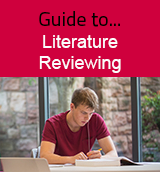
"Trying to find out everything relevant to your topic of study is for me the most fundamental part as only then can I build on any gaps or unanswered questions that may still remain"
(Source: Vitae - The Informed Researcher)
What do you already know about your topic and where are the gaps in that previous research? Information scoping should have identified the initial extent of the information in your field and the key search terms.
 Now carry out a full systematic literature review. Use a range of sources include Google Scholar, academic databases and other field specific resources. Remember literature reviewing is an iterative process - re-visit both your literature search and the results frequently during your study.
Now carry out a full systematic literature review. Use a range of sources include Google Scholar, academic databases and other field specific resources. Remember literature reviewing is an iterative process - re-visit both your literature search and the results frequently during your study.
It is also the first stage of data collection so plan this now. Learn to use a reference manager to keep your references and papers well organised.
The review should allow you to place your research in the wider context and demonstrate connections with existing research in the field. It should distinguish what research has already been done and allow you to identify how your research will contribute new knowledge.
Guides
 Google Scholar - Get the most out of Google, set up links to Library-purchased resources.
Google Scholar - Get the most out of Google, set up links to Library-purchased resources.
Are you thinking about finding information or managing references for your research? Contact your Subject Librarian to discover the guidance, support and training we can offer.